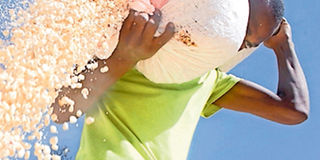Brief news on farming and agribusiness developments from around the region

A man carries a sack of maize. Vihiga governor, Wilbur Ottichilo blamed the food crisis in his county to peoples’ love for maize and bean farming and disregard for other crops. FILE PHOTO | NMG
What you need to know:
- Traders selling fish and Silver cyprinid (omena) are also doing booming business as the county grapples with a food crisis.
- Dr Ottichilo, a specialist in natural resource management and climate change, believes investment in irrigation and farmer education would change the tide.
- Ottichilo points out that if farmers in western Kenya could access water for irrigation throughout the year, then they can easily invest in horticulture and take advantage of the Kisumu International Airport to send their produce abroad, and supply hotels all over the country.
- Bt cotton is resistant to diseases and offers higher yields, with the government seeking to use the crop to revive the ailing industry and boost manufacturing of textile.
County blames high food imports on farmers’ love for maize
as the rains pound different parts of the country this season, most kitchen gardens in Vihiga have no vegetables.
Consequently, traders selling cabbages sourced from Rift Valley have descended markets in the county, especially Luanda, offloading the vegetables amid high demand.
Traders selling fish and Silver cyprinid (omena) are also doing booming business as the county grapples with a food crisis.
Wilbur Ottichilo, the Vihiga governor, blames the food crisis in his county to peoples’ love for maize and bean farming.
“Over the years, people have concentrated on farming maize and beans despite having very small pieces of land,” he tells Seeds of Gold, however, noting the problem is not unique to Vihiga.
Dr Ottichilo, a specialist in natural resource management and climate change, believes investment in irrigation and farmer education would change the tide.
“We can easily turn our county into a net high-value crop production zones, and that is the journey we have embarked on,” says the governor.
“We have all the advantages, the good climatic conditions, plenty of fresh groundwater, frequent rainfall and sufficient manpower. So what we need is just to start harvesting rainwater and sink boreholes not just for drinking water, but also for smallholder irrigation projects,” he adds.
Irrigation is "the magic bullet" for the global agricultural revolution, says Prof Nuhu Hatibu, the regional head of Alliance for a Green Revolution in Africa (Agra), which working with the World Bank, is in the process of delivering some $9 billion (Sh900 billion) in technologies, public investment, commercial financing, and training to accelerate farmer-led irrigation for smallholder farming in Africa — a facility that Vihiga and other counties can take advantage of.
“The most important thing is for governments to recognise this as a mechanism to rapidly expand irrigation and make it available to smallholders to complement what they are already doing on large-scale,” Steven Schonberger, the World Bank's global lead for water in agriculture, says.
Ottichilo points out that if farmers in western Kenya could access water for irrigation throughout the year, then they can easily invest in horticulture and take advantage of the Kisumu International Airport to send their produce abroad, and supply hotels all over the country.
In Vihiga and most parts of western Kenya, many people harvest rainwater for drinking and domestic use, with nearly zero per cent of them doing it purposely for irrigation.
“We are already changing the tide, investing in water pans, sinking boreholes for irrigation purposes, and we are promoting other different rainwater harvesting techniques as we move to make the county food secure and self reliant,” says the governor.
-Isaiah Esipisu
****
Bt cotton plan faulted
Food security lobby groups have opposed government’s plan to introduce genetically modified cotton, noting it is not safe to human beings and animals.
Route to Food Initiative (RFI), Kenya Biodiversity Coalition (KBioC), Africa Biodiversity Network (ABN) and Greenpeace Africa termed the move as untimely and fraught with risks.
Bt cotton is resistant to diseases and offers higher yields, with the government seeking to use the crop to revive the ailing industry and boost manufacturing of textile.
“Why do we want to introduce Bt cotton when the 2012 ban on GM food imports is still in effect,” Anne Maina of KBioC posed, noting the government should look into the health effects GMOs.
Layla Liebetrau, the programmes lead RFI, said the crop would lure farmers into the use of agrochemicals and stands in the way of sustainable solutions, such as ecological agriculture.
Green Peace senior manager Renee Olende said GMO’s are not the solution to food security. “BT cotton failed in Burkina Faso and South Africa throwing farmers into greater poverty, we call upon the government to reconsider its position.” she said.
-Faith Nyamai





